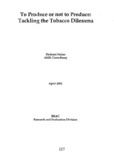| dc.description.abstract | This study seeks to look into the economics of tobacco cultivation in Bangladesh. At tire macro level, tire importance of tobacco farming has been declining. However, a survey conducted on 300
tobacco farmers in 19 villages of Rangpur and Kushtia revealed the increasing importance of
tobacco at the micro level with more-tlum a quarter of tire sample farmers joining tire rank of a
tobacco farmer in tire past five years. The driving force behind this phenomenon has been the
apparent profitability of growing this crop. Tobacco cultivation requires intensive labour and
most farmers economise on the labour cost by using their own household labour. When the
imputed value of this is taken into account, tobacco loses much of its profitability. Therefore,
when weighed on a cost-benefit scale, tobacco often yields a lower economic profitability titan a
number of other crops. Our study identified some of these crops as maize, potato, sugarcane,
sunflower, cauliflower and tuberose. Most farmers seemed aware of the health and environmental
hazards to tobacco but continued growing the crop because of overriding factors such as
guaranteed market and ready cash (which is not tire case with most other crops). Even though
tobacco is a good source of revenue for tire government, this industry cannot be promoted given
its 'merit bad' character. Informing the farmers about tire true economies of tobacco, providing
marketing facilities, introducing sustainable procurement drives at reasonable prices and
enhancing tire storage capacity of alternate high value crops could act as catalysts for farmers to
quit tobacco farming. | en_US |

